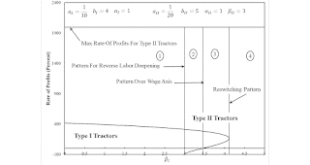Many of my examples illustrate simple structures of production for models in which commodities are produced with commodities. Economists following the Austrian school often illustrate the structure of production with Hayekian triangles. Accordingly, this post illustrates a Hayekian triangle with a model in which commodities are produced out of commodities. I consider the case in which only circulating capital exists. This post is a rewrite of this one. The following are taken as given for...
Read More »Maynard Keynes Making Fun Of The Austrian School
This is for my commonplace book. "It is true that some lengthy or roundabout processes are physically efficient. But so are some short processes. Lengthy processes are not physically efficient because they are long. Some, probably most, lengthy processes would be physically very inefficient, for there are such things as spoiling or wasting with time. With a given labour force there is a definite limit to the quantity of labour embodied in roundabout processes which can be used to...
Read More »Francis Spufford On Commodity Fetishism As A Dance
I have expressed an appreciation before of the section in Capital on commodity fetishism. Perhaps this section stands up to a critique of Marx's theory of value. "But Marx had drawn a nightmare picture of what happened to human life under capitalism, when everything was produced only in order to be exchanged; when true qualities and uses dropped away, and the human power of making and doing itself became only an object to be traded. Then the makers and the things made turned alike into...
Read More »A Derivation Of Prices Of Production With Linear Programming
1.0 Introduction This post illustrates a derivation of prices of production, based on certain properties of duality theory as applied to linear programming. I strive to be more concise and elementary than previous expositions. This exposition is based on John Roemer's Reproducible Solution (Analytical Foundations of Marxian Economic Theory, Cambridge University Press, 1981). You will find no utility maximization or supply and demand functions below. I have no need for such hypotheses....
Read More »Nancy Kress On Global Inequality And Poverty
I picked up the novel that the following quotation is from because I think I recall Kress participating in conversations on Usenet years ago. This novel ended up more a political argument than I expected. It is for Genetically Modified Organisms (GMOs), done right. We should rather strive for plants for food resistant to insects, not resistant to pesticides, for example. I assume that Kress agrees with her heroine. "He had spent the two-week winter vacation from school,...
Read More »Where Do Prices Come From In Marginalist Economics?
1.0 Introduction Where do prices come from in mainstream economics? As far as I know, some hard questions were raised half a century ago. They still have not been answered, I gather. 2.0 No Agent Makes Prices Consider competitive markets, as defined in marginalist economics for most of the twentieth century. This implies that agents in the market take prices as given. From Steve Keen, I know that if only a countable infinity of consumers and firms exist, the agents are systematically...
Read More »Reswitching Pattern In Corn-Tractor Model
Figure 1: Variation in the Cost-Minimizing Technique with Selected Coefficient of Production This post reports on some work with Steedman's corn-tractor model. I have yet to find an instance of triple-switching. I have found a case of reswitching, though. Figure 1 above and Table 1 below show how switch points vary with perturbations of the labor needed to produce a bushel of corn in the corn industry with Type I tractors. Only one switch point exists in region 1. Around this switch point...
Read More »Ludwig Von Mises, Male Chauvinist
Ludwig Von Mises expanded his erroneous 1920 essay into a book, Socialism: An Economic and Sociological Analysis. The first edition was published in 1922 and the second edition in 1932. Since Von Mises is attempting to be more comprehensive, he treats the socialist advocacy of free love in an early chapter. Being au courant, he writes about Freud. He argues that the bourgeois idea of marriage as a contract, binding on both husband and wife, is an improvement on what came before. But I...
Read More »Goal: Perturb Special Case Of Steedman’s Corn-Tractor Model
1.0 Introduction I would like to illustrate triple switching, in the corn-tractor model, with one of my one-dimensional diagrams. I have a triple-switching example, from Bertram Schefold, but the wage-rate of profit frontier is not visually striking in it. Such an example would not be worthy of a research paper. But perhaps I could modify a section of my recent working paper to submit somewhere. Besides, posing a new problem might motivate me to update my computing technology. 2.0...
Read More »Elsewhere
Louis-Philippe Rochon on Paul Davidson. James Galbraith, Thomas Palley, and Matias Venengo on Paul Davidson. The Economist on Donald Harris. Response in letters to the editor (Both behind paywall). The Washington Post on policy advice from Donald Harris for Jamaica (Behind paywall). Maybe I want to read Vanessa Wills' Marx's Ethical Vision, which may be in tension with views I have set out. Gordon Katic on the insidious elitist upshot of behavioral economics.
Read More » Heterodox
Heterodox

